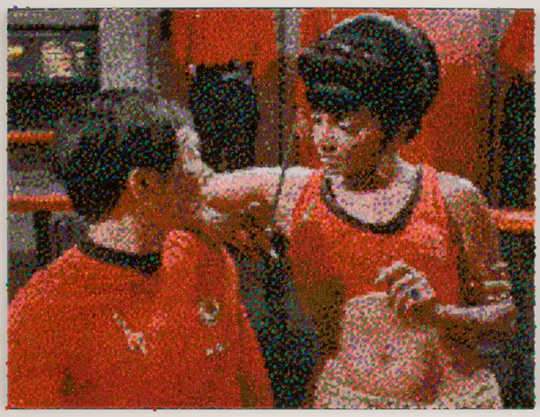Uhura
and Sulu (The game has rules), 2007-08
by Devorah Sperber

This work is one of three smaller chenille stem works based on scenes from the 1967 Star Trek episode "Mirror, Mirror" in which a transporter mishap switches the crew of the Enterprise with their evil counterparts, trapping them in a "savage parallel universe."
NOTE: When viewed up-close, the imagery dissolves into an odd mix of colored pixels/stems, in reference to the way images are transmitted via electronic beams to light up the 200,000+ television-screen pixels which make up the images we see while watching TV. Also, the chenille stems sparkle as light reflects off the twisted wire cores.
Premise: This work debuted in my exhibition titled "Mirror Universe" which exemplified my continued interest in the links between art and science-- in particular how consciousness and the act of seeing create the illusion of a stable, predictable, and singular universe.
The title "Mirror Universe" was inspired by the 1967 Star Trek episode Mirror, Mirror in which a transporter mishap switches the crew of the Enterprise with their evil counterparts, trapping them in a "savage parallel universe." This struck a poignant chord.
Although I am not a "Trekkie," I have a vague recollection of watching reruns of the original Star Trek series in the 1970s with my father. I also watched Star Trek: The Next Generation (a.k.a. TNG) for a while in late 1980s, but I was never a fanatic until 2002, when for a few months, I began scheduling my days so I could watch reruns of Star Trek: TNG shown every afternoon on Spike TV. I remember wondering why I was so intrigued.
Eventually I realized that series Star Trek: TNG offered an escape from the tumultuous post 9-11 world by presenting a utopian perspective of humanity at its best. The mission of the TNG Enterprise was exploration and with the exception of the Borg (their defining motto was "resistance is futile"), the crew's confrontations with alien life-forms were mostly based on misunderstandings and cultural differences vs. battles between good and evil. The idea of doing a series based on Star Trek has been gestating since that time. The concept and title for this exhibition gelled when I realized every Star Trek series had at least one episode based on the concept of a mirror or parallel universe, which fit in with my ongoing interest in the link between art and science, human perception, and subjective reality.
About Parallel Universes: "For years Parallel Universes have been a staple of science fiction. Scientists now believe there may really be a parallel universe - in fact, there may be an infinite number of parallel universes, and we just happen to live in one of them. It started when superstring theory, hyperspace and dark matter made physicists realize that the three dimensions we thought described the Universe weren't enough. By the time they had finished they'd come to the conclusion that there are eleven dimensions and that our Universe is just one bubble among an infinite number of membranous bubbles which ripple as they wobble through the eleventh dimension."- Quoted from the BBC Television Program: Parallel Universes (February, 14, 2002)
*Partial funding by Coats and Clark
Devorah Sperber is a New York-based artist whose sculptures, composed of thousands of ordinary objects, negotiate a terrain between low and high tech. Her labor-intensive works explore repetition and the effects of digital technology on perception, scale, and subjective reality. -Patricia Phillips, Executive Editor, Art Journal
© Devorah Sperber Inc. 2000